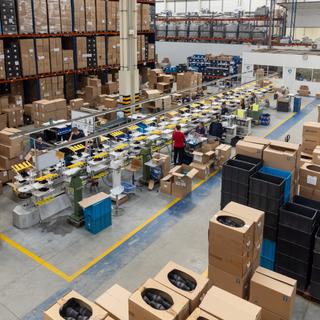Portugal's Shoe Valley is Moving Upmarket
In a deteriorating economic climate, Portugal, Europe's second-largest footwear producer, is modernizing its industry and expanding into luxury goods to compete with Asian markets. This transformation is crucial for sustaining its position in the global footwear sector.
 ATTILIO FIUMARELLA FOR LE MONDE
ATTILIO FIUMARELLA FOR LE MONDE
Investment and Growth
The Aloft factory, established in 1994, is a prime example of this modernization. Sales manager Ruben Duarte highlights significant investments in new technologies, with machines costing up to €1 million. Aloft produces millions of boots for Decathlon and utilizes advanced machinery like the eBlast, which creates soft soles using nitrogen-blown foam. With European Union support, Aloft has received up to 30% public aid for its innovations.
According to the APICCAPS, the Portuguese footwear producers' federation, €600 million will be invested in the sector by 2030, with a significant portion coming from European funds. The industry employs over 33,000 people across 1,171 companies, showcasing the importance of this sector in Portugal.
Meeting Orders Within Three Months
Despite producing significantly less than the 24 billion pairs manufactured globally each year, the Portuguese industry has seen a resurgence in interest, especially during the Covid-19 pandemic. Many brands moved away from Asian subcontractors, leading to an influx of orders in Portuguese factories. Fernanda Moreira, president of the Shoe and Leather Goods Workers' Union, notes that this shift has been beneficial for the industry.
The competitive edge of the Portuguese footwear industry lies in its low labor costs and the ability to fulfill orders within three months, making it an attractive option for brands looking to reduce their environmental footprint. The country’s electricity is primarily from renewable sources, further appealing to eco-conscious brands.
 ATTILIO FIUMARELLA FOR LE MONDE
ATTILIO FIUMARELLA FOR LE MONDE


Comments
Join Our Community
Sign up to share your thoughts, engage with others, and become part of our growing community.
No comments yet
Be the first to share your thoughts and start the conversation!